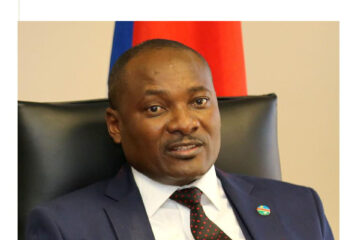Martin Endjala
The Electricity Control Board Chief Executive Officer Robert Kahimise blamed the underperformance of the Ruacana Hydro Power Plant as one of many contributing factors to the high cost of electricity imports, which leads to a higher tariff under-recovery.
The CEO made this remark during the announcement of ECB’s revision of bulk electricity tariffs last week Friday in Windhoek.
He said that the electricity that was not generated at Ruacana as anticipated during the previous period was replaced by imports at a higher cost.
The Ministry of Mines and Energy and relevant government stakeholders will soon engage their Angolan counterparts to discuss the matter of low water flow of the Kunene River to ensure higher production levels at the Ruacana Hydro Power Plant. With a capacity of 347 megawatts, the plant is Namibia’s largest hydroelectric power generating facility.
Compared to other generation sources, electricity is generated relatively cheaply at Ruacana. Therefore, less generation at Ruacana means increased generation of power from expensive alternatives or imports at higher costs.
Due to significant rainfall in the central and upper parts of the Kunene River catchment area in Angola, which started in March and lasted until the beginning of April this year, the plant operated at full load with NamPower supplying more than 95 percent of Namibia’s electricity demand from the hydroelectric station. To help mitigate this, Nampower has implemented new generation capacity and this electricity generation project is expected to be commissioned next year in April. The ECB has so far issued 73 electricity Generation licenses of which 50 are operational, three are under construction and 20 are still under development.
“We hope that those licensees that have not yet commissioned their plants will do so soon and that they will have a positive impact on end-consumer prices,” said Kahimise.
The Modified Single Buyer better known as the MSB market model, Kahimise says that it is intended to allow certain consumers to transact directly with Independent Power Producers (IPPs) for competitive tariffs.
The implementation of the MSB Market Model is said to be well underway following the promulgation of the Market Rules in December 2022.
There are three Solar PV plants with a combined installed capacity of 21 MW established under the MSB Model that will be commissioned in the next two months.
This means that more electricity will be generated locally, hence reducing imports. It is further anticipated that there will be more IPPs operating on bilateral agreements with Contestable Customers including export into the Southern Africa Power Pool. Furthermore, the CEO maintains that Electricity cost is part of the calculation of inflation, since the tariff is increasing above the current inflation rate of 6.1 percent (April 2023) at 8.97 percent, it is expected that the tariff increase will put further pressure on future inflation and therefore on prices of goods and services. Although minimal, the ECB acknowledges that there is an impact on the economy and consumers due to the increase in electricity tariffs.
On the issue of power shortage in the country, the ECB Head emphasized that the Southern African region continues to experience a substantial shortage of electricity which is putting pressure on electricity supply and tariffs not only in Namibia but in all the countries in the SADC Region.
This situation is expected to prevail until enough new generation capacity has been built. In mitigating the possible shortage of electricity, Kahimise revealed that the government through the Ministry of Mines and Energy have established a Technical Committee to ensure that the security of the electricity supply in Namibia is maintained.
The ECB further noted that it is aware of the ongoing NamPower’s Debt Collection Plan, which is intended to ensure that total debt exceeding N$1 billion is recovered from those customers that are in arrears through the implementation of the provisions of the respective power supply agreements and in line with NamPower’s Credit Policy.
The ECB however, agrees that this plan should have been implemented systematically at much earlier stages to prevent it from threatening the current economic recovery.
They will, therefore, engage NamPower to fully understand the implementation process of the plan and will work with NamPower and the affected licensees to try to find a sustainable solution to the matter.




